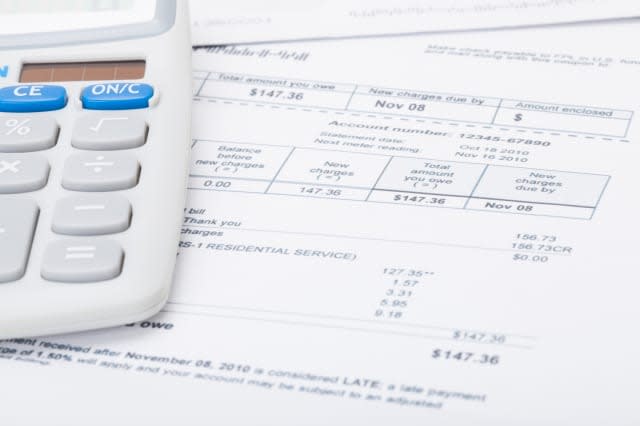1 in 10 'find energy bills a struggle'

One in 10 households in England are struggling with their fuel bills, official figures show.
Some 2.35 million households were in fuel poverty - judged as facing both low incomes and high energy costs - in 2013, the latest year for which the figures are available.
It is a reduction of just 0.5% from 2012, when 2.36 million families were in fuel poverty, the data from the Department of Energy and Climate Change (Decc) showed.
The gap between the bills fuel-poor households face and what they can afford to pay was £374 on average in 2013, a reduction from £385 the previous year, with the total gap across all homes in fuel poverty falling from £909 million to £877 million.
Poor households have seen larger rises in incomes and smaller increases in fuel costs than the overall population, helping shrink the gap.
Search for a cheaper energy tariff
But as the rise in incomes has been concentrated in very low paid households, they are in fuel poverty and the number of fuel-poor households has remained broadly the same, the statistics suggest.
Just one in 20 families (5%) struggling to pay their fuel bills lives in a property which meets decent standards of energy efficiency, graded A-C on a scale that runs down to a G grade for the coldest, draughtiest properties.
Almost a third of households living in G-rated properties (31%) were in fuel poverty.
Families living in privately rented accommodation continue to have the highest fuel poverty rates, the statistics show.
Regulations brought in last year set a fuel poverty target to ensure as many fuel-poor homes as is reasonably practicable achieve a minimum energy efficiency rating of band C by 2030, with interim milestones of band E by 2020 and band D by 2025.
But fuel poverty campaigners have called for energy efficiency to be made a "national infrastructure priority", with funding and street-by-street schemes installing insulation and other energy saving measures to improve the UK's housing stock.
Find a cheaper energy deal
Jenny Saunders, chief executive of National Energy Action (NEA), a charity which campaigns to end fuel poverty, said: "We know the cost and suffering caused by fuel poverty is grave and likely to increase in the future without more adequate national and UK wide responses."
She said NEA research had shown that there had been 41,000 preventable deaths caused by cold homes in the last five years across the UK.
"NEA also estimates that national health services will need to spend billions treating cold-related morbidity, in excess of £22bn in England and Wales alone over a 15-year period," she warned.
A Decc spokeswoman said: "These improvements in fuel poverty levels are encouraging because they show that we are moving in the right direction.
"Helping low income households to improve their energy efficiency can make a real difference in helping to keep their bills down."
But Ed Matthew, director of the Energy Bill Revolution campaign against fuel poverty, said: "To end fuel poverty, the Government wants to raise the energy efficiency of fuel poor homes by bringing them up to band C on an Energy Performance Certificate by 2030.
"But at current rates of installation it will take 100 years to get them up to this standard. A major boost in the delivery of energy efficiency measures is needed. This can be achieved by making it a national infrastructure priority.
"This investment can end fuel poverty, slash carbon emissions, reduce NHS costs and create over 100,000 jobs. No other infrastructure investment could achieve so much for so many."
Friends of the Earth energy campaigner Sophie Neuburg said: "These figures hugely underestimate the number of people struggling to pay their bills - research shows there are six million low-income households shivering in heat-leaking homes.
"Even by its own figures, Government policy is failing. Despite warm words, only a tiny number of people have been helped since last year.
"The new Government must make energy efficiency a major infrastructure commitment and set a target to properly insulate four million homes by 2020.
"Not only would this bring millions of households out of the misery of fuel poverty, it would create thousands of jobs and slash carbon emissions too."
Read more on AOL Money
Trim your bills
Missing a bill could cost you your job - or your home
Does your old energy supplier owe you money?




